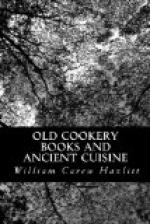Even in the latter part of the seventeenth century the old-fashioned dishes, better suited to the country than to the Court taste, remained in fashion, and are included in receipt-books, even in that published by Joseph Cooper, who had been head-cook to Charles I, and who styles his 1654 volume “The Art of Cookery Refined and Augmented.” He gives us two varieties of oatmeal pudding, French barley pudding, and hasty pudding in a bag. There is a direction for frying mushrooms, which were growing more into favour at the table than in the days when Castelvetri, whom I cite in my monograph on Gardening, was among us. Another dainty is an ox-palate pie.
Cooper’s Preface is quaint, and surely modest enough. “Though the cheats,” says he, “of some preceding pieces that treated on this subject (whose Title-pages, like the contents of a weekly Pamphlet, promised much more than the Books performed) may have provided this but a cold intertainment at its first coming abroad; yet I know it will not stay long in the world, before every rational reader will clear it of all alliance to those false pretenders. Ladies, forgive my confidence, if I tell you, that I know this piece will prove your favourite.”
Yet Cooper’s performance, in spite of its droll, self-complacent vein in the address to the Reader, is a judicious and useful selection, and was, in fact, far more serviceable to the middle-class gentry than some of those which had gone before. It adapted itself to sundry conditions of men; but it kept in view those whose purses were not richly lined enough to pay for dainties and “subtleties.” It is pleasant to see that, after the countless centuries which had run out since Arthur, the bag-pudding and hot-pot maintained their ground—good, wholesome, country fare.
After the fall of the Monarchy in 1648, the chef de cuisine probably found his occupation gone, like a greater man before him; and the world may owe to enforced repose this condescension to the pen by the deposed minister of a king.
Soon after the Restoration it was that some Royalist brought out a small volume called “The Court and Kitchen of Elizabeth, commonly called Joan Cromwell, the wife of the late Usurper, truly described and represented,” 12mo, 1664. Its design was to throw ridicule on the parsimony of the Protectoral household. But he recites some excellent dishes which made their appearance at Oliver’s table: Dutch puddings, Scotch collops of veal, marrow puddings, sack posset, boiled woodcocks, and warden pies. He seems to have understood that eight stone of beef were cooked every morning for the establishment, and all scraps were diligently collected, and given alternately to the poor of St. Margaret’s, Westminster, and St. Martin’s-in-the-Fields. The writer acquaints us that, when the Protector entertained the French ambassador and the Parliament, after the Sindercome affair, he only spent L1,000 over the banquet, of which the Lady Protectress managed to save L200. Cromwell and his wife, we are told, did not care for suppers, but contented themselves with eggs and slops.




